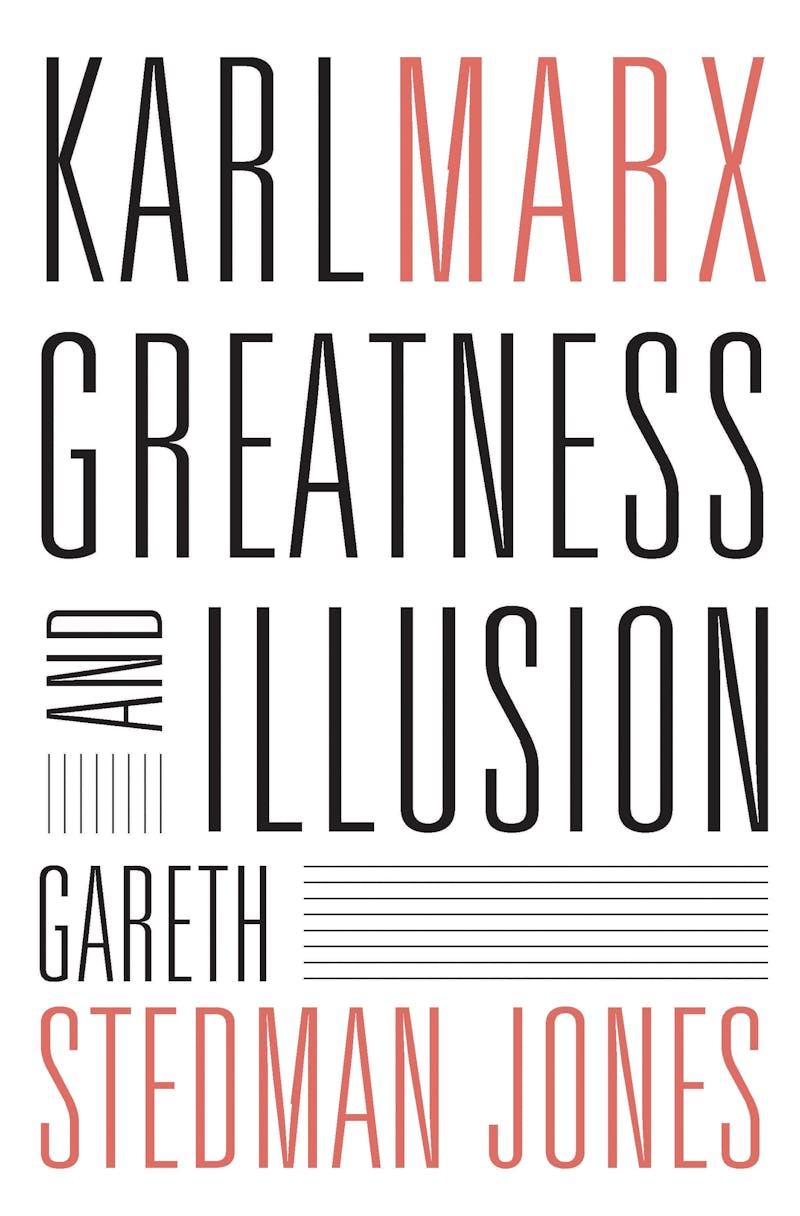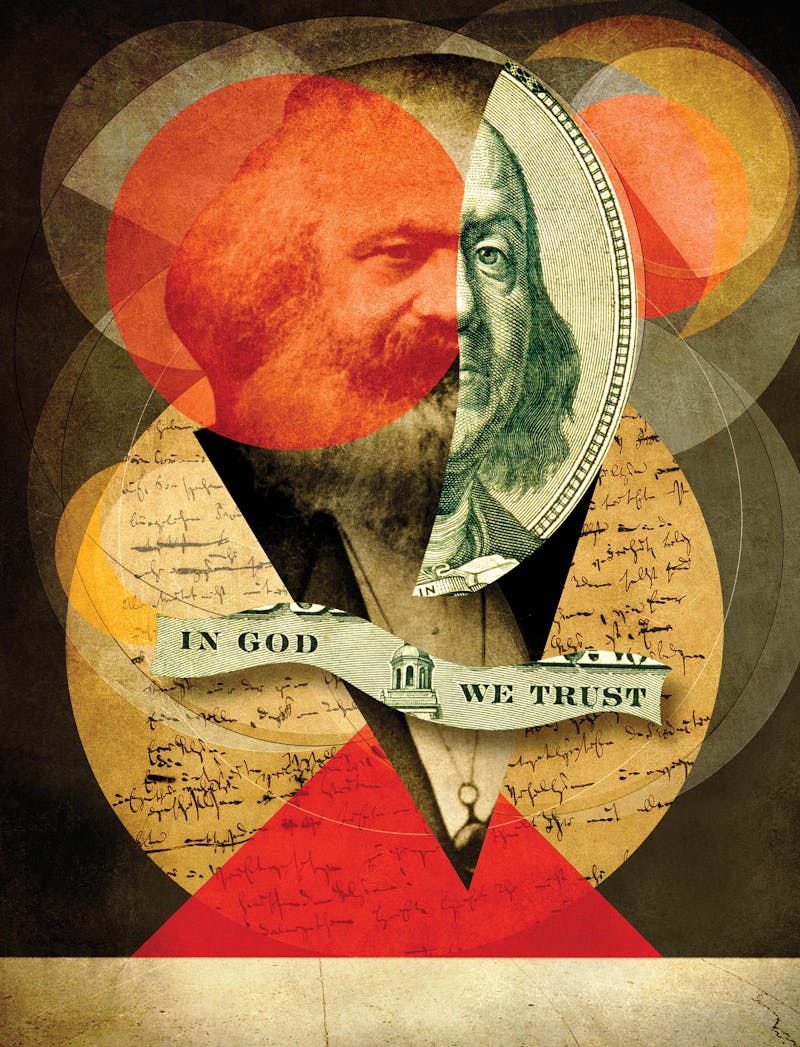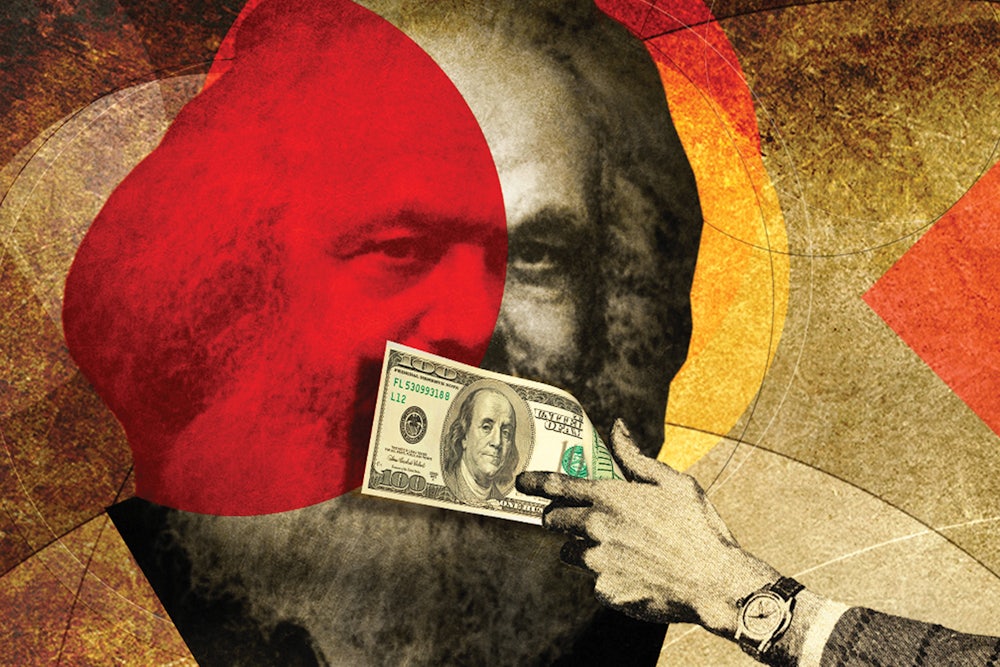Does Karl Marx still matter? It’s a question most readers of a new biography of Marx would ask—even if they are already steeped in the contentious scholarship about (or the perpetual ideological skirmishes within) the radical left. What relevance can his life and work have in a world where nearly every socialist party long ago made its peace with capitalism, and at a time when his writings are read far more by academics than by the workers he longed to liberate? Even Bernie Sanders, who calls himself a “socialist,” just wants to force the governing and economic elites to treat wage earners and consumers more fairly. He wants a new New Deal, not a “dictatorship of the proletariat.”

The decline of Marx’s influence does not seem to worry Gareth Stedman Jones. At many points in his new book, Karl Marx: Greatness and Illusion, he even seems to welcome it. That may appear an odd stance for a distinguished left-wing historian of Britain, best known for his studies of the Victorian-era working class; Stedman Jones was, for almost two decades, a member of the editorial board of New Left Review—the most prominent and sophisticated venue for Marxian thought in the English-speaking world. Yet he has come to believe that the “dogmatic assumptions” of many Marxists inhibit “the writing of good history.” His study is thus a prolonged exercise in scraping off the dogma to get at the unvarnished figure, the Marx who died before he could turn into an “ism” both esteemed and reviled.
Stedman Jones maintains that the iconic image of Marx, created soon after his death in 1883, ignores historical context and a good deal that his work got wrong. The “forbidding bearded patriarch and lawgiver, a thinker of merciless consistency with a commanding vision of the future” worshiped by leftists was, in Stedman Jones’s view, a flawed theorist and failed revolutionary socialist, who overlooked the significance of the democratic revolution he was actually living through. What’s more, as a political refugee in working-class London who was rarely healthy, he struggled constantly to keep his children nourished, housed, and well-educated. He was also an arrogant soul who took criticism of his work as something like an act of war. “The aim of this book,” writes Stedman Jones, “is to put Marx back in his nineteenth-century surroundings,” shedding “posthumous elaborations of his character and achievements.”
Most of the biography is devoted to a careful, occasionally pedantic evaluation of what is useless in Marx’s work and what remains of value. Stedman Jones provides lengthy examinations of his subject’s battles with other radical thinkers, his painstaking labors on Capital, and his ongoing quest to locate and rev up engines of change, to put an end to the exploitation of man by man and lay the foundation of a classless society. Stedman Jones includes just enough details of Marx’s personal life to justify labeling the book a biography instead of purely a study of his ideas and their consequences. Stedman Jones dutifully quotes the man he calls “Karl” complaining about his chronic liver disease and carbuncles, and continually pleading for financial support from Friedrich Engels, his sometime collaborator and ever-faithful friend.
Marx’s spouse and daughters also make intermittent appearances, revealing a formidable yet tragic family history. During the American Civil War, Karl’s daughter Eleanor, then ten years old, “wrote to Lincoln, appointing herself his political adviser.” Later, she would become a leading Socialist and feminist, who translated Ibsen and Flaubert into English. But Eleanor’s renown did not lift her from despair at the acts of an unfaithful lover. At 43, she committed suicide by poisoning herself. For her part, Marx’s wife, Jenny, wrote reviews for a major German newspaper and organized a group of Londoners who read Shakespeare out loud to one another. Yet three of her children died very young, and like her husband, she was often plagued by protracted ailments. A hidden resentment may have exacerbated her poor health: Jenny probably knew that Karl had fathered a son with their longtime housekeeper. But if she ever spoke of it, that detail has never been recorded.
Recent biographies of Karl by Jonathan Sperber, of Jenny by Mary Gabriel, and of Eleanor by Rachel Holmes narrate all these tales at greater length and with more insight. Stedman Jones chooses instead to focus on the evolution of Marx the radical intellectual—and immensely learned individual—who was always “determined to impress himself upon the world.”
Marx first made a name for himself as the fierce rival of other left-wing intellectuals during the early to mid-1840s. Much of Europe was then ripe for revolution. Industrial workers crowded into cities from Paris to Warsaw, demanding reforms that hereditary crowned rulers would not or could not grant. Marx, who made a precarious living as a radical journalist, insisted on the centrality of labor both to making a capitalist system possible and to transcending it, someday soon. This stance embroiled him in acrimonious debates with radicals who argued that private property or a state that neglected the needs of its citizens was the true root of oppression. “In Karl’s view,” writes Stedman Jones, “the labour question was not simply about consumption or wages. The ambition of organized workers was not simply to attain ‘greater happiness’ through the acquisition of more material goods, but to change productive relations.”

However, when uprisings did break out across the continent during the spring of 1848, Marx, in Stedman Jones’s view, proved a poor guide to their causes and how they might triumph. That February, with help from Engels, he had written The Communist Manifesto for a tiny group of radical artisans, based in London; in it, he boldly described capitalism as a dynamic system, run by a “bourgeoisie” that “cannot exist without constantly revolutionising the instruments of production, and thereby the relations of production, and with them the whole relations of society.” However, carried away with the heady reality of working men and women across Europe rushing to barricades to topple the bad old order, Marx neglected to understand that most of these “proletarians,” together with their middle-class allies, were demanding the right to vote and to be represented in parliaments, not to abolish the wage system, as Marx desired.
Marx kept calling for, and predicting, the emergence of “a separate proletarian party” to lead an economic upheaval, instead of fighting merely for “bourgeois” political change. A few years later, in The Eighteenth Brumaire, he wrote a memorable account of how the uprising in France ended up with the election of Louis-Napoleon Bonaparte as president. The nephew of the first Napoleon then staged a coup and named himself Emperor Napoleon III. But in the heat of conflict, Marx had been quite unable to see the need for forging a coalition across class lines. According to a German republican who witnessed Marx in action, “Everyone who contradicted him, he treated with abject contempt; every argument he did not like he answered either with biting scorn at the unfathomable ignorance that had prompted it, or with opprobrious aspersions upon the motives of him who had advanced it.”
To be sure, a written constitution and free elections could not do away with class injustice. But as Stedman Jones correctly points out, they might have stopped the army of a king or an emperor from crushing popular rebellions and established something like a rule of law. A keen student of society like Marx ought to have empathized with that desire. But as Marx’s erstwhile mentor Arnold Ruge once told him, “My friend, you believe in what you wish for.”
In the gray aftermath of the failed revolutions of 1848, Marx gradually returned to work on Capital, his grand opus of political economy. The work went slowly, in part because of his many ailments and in part because Marx found it difficult to shake depression about both his relative obscurity and the conservative turn in European politics. In 1862, he got so low that, “wondering whether he should try to do something else in life … he applied for a job as a railway clerk.” Imagine Marx snarling about “the cash nexus” as he tosses a vacationing English family a fistful of tickets to Brighton.
Like other biographers, Stedman Jones places Capital, the first volume of which finally appeared in 1867, within the context of the economic boom Europe experienced in mid-century. As railroad lines and factories spread across the land, a soberer Marx retreated from his youthful predictions of the working class’s imminent triumph and elaborated a complex theory about the operations of that system and how it would eventually collapse under the weight of such insoluble “contradictions” as a falling rate of profit. With revolution no longer on the immediate agenda, he took refuge in explaining why the existing economic order could not endure.
Stedman Jones seeks to demolish the notion that, in Capital, Marx explained anything significant about the workings of capitalism—either then or now. His theories of “surplus value” were vague and undeveloped, he was wrong about the increasing immiseration of workers, and he encouraged readers to believe the capitalist system would fall apart through what Stedman Jones calls “the conjunction of impersonal and inevitable processes, detached from the actions of human agents.”
Where Marx did excel, according to Stedman Jones, was in his vivid and lavishly detailed descriptions of the miserable lives of ordinary English workers, which he had spent years researching in the British Museum. He thus became a pioneer in “the systematic study of social and economic history.” In other words, Marx achieved greatness only when he set aside his theoretical illusions and stuck to the facts, exposing a cruelly oppressive system. This may be the kind of conclusion one would expect a social and economic historian to make, although Marx’s theory of how capitalism supposedly works has surely stirred more people over time than the richness of his empirical prose.
And one doesn’t have to be a Marxist to appreciate the cogency of several of Marx’s big ideas. He was, of course, quite wrong about the evolution of capitalism: The real income of wage earners increased over the course of the twentieth century, while a white-collar class and small businesses mushroomed in defiance of Marx’s prediction that “the proletariat” would become an ever-poorer majority. Yet he brilliantly captured the propulsive dynamic of the system. Capitalism did conquer “the world market” and give “a cosmopolitan character to production and consumption in every country,” as the Manifesto phrased it. His model of how “forces of production” come into conflict with “relations of production” also remains a sound explanation of how workers revolt against their bosses in every type of society—even “socialist” ones like the USSR and China. And our credulous addiction to the magical little computers in our pockets and purses demonstrates the wisdom of the section about “the fetishism of commodities” in the first volume of Capital.
Marx has a larger epistemological claim on our attention as well. Just as one cannot discuss human psychology intelligently without coming to grips with Freud’s work, despite its flaws, Marx’s historical analysis of class relations remains a powerful way to understand the enduring economic inequalities of his time and ours. As a prophet of socialism, he was a bust. He drew only vague sketches of what an egalitarian order should look like. This made it possible for Lenin, Stalin, Mao, and their ilk to use his words to justify the horrors they committed in peasant societies quite different from the industrial ones where Marx had expected socialism to triumph.
Still, he captured some basic truths about the capitalism he believed was doomed to expire. Perhaps the most lasting of these truths is the relentless destruction of traditions—whether oppressive or comforting—that is the hallmark of modernity. In 1848, when Marx described capitalism as a revolutionary force, he did not realize how it would not just endure but grow. But he did understand, as the great historian-critic Marshall Berman once wrote, that its power was not just a matter of money and production, of work and authority:
He knew we must start from where we are … thrown back on our individual will and energy, forced to exploit each other and ourselves in order to survive; and yet, in spite of it all, thrown together by the same forces that pull us apart … to develop identities and mutual bonds that can help us hold together as the fierce modern air blows hot and cold through us all.
The same system in which “all that is solid melts into air” and “all that is holy is profaned”—those famous lines from The Communist Manifesto—can free us to envision a more egalitarian, and no less modern, way of running our economy and organizing our civic life. Marx the materialist does not matter as he once did. But the Marx who imagined capitalism liberating humanity from the bonds of tradition still might.
